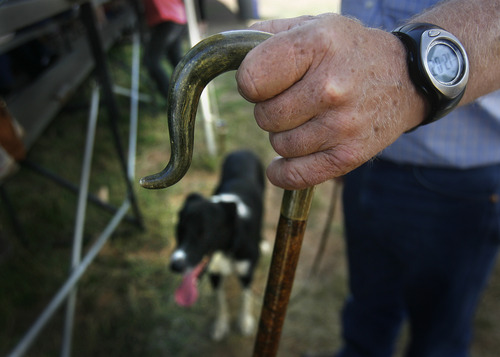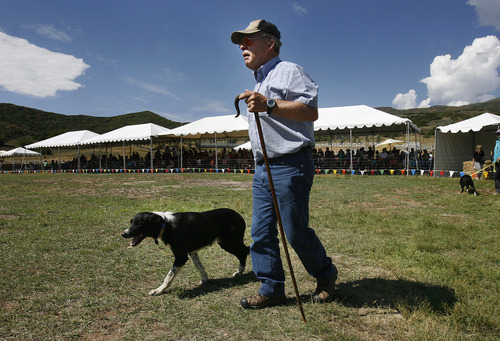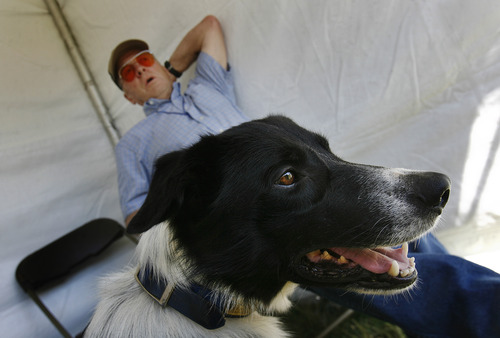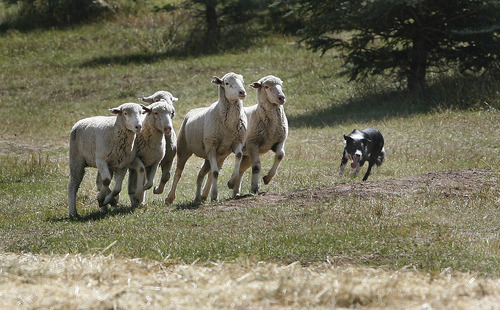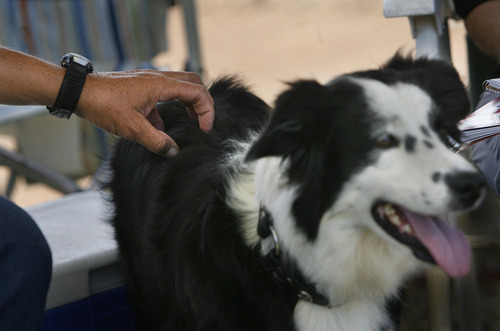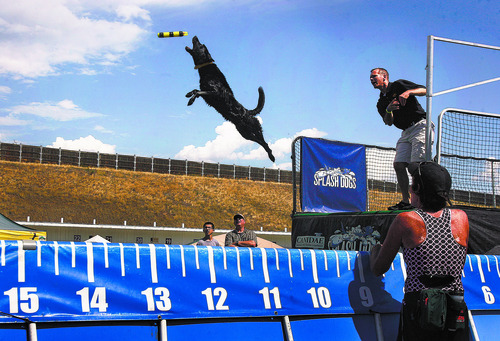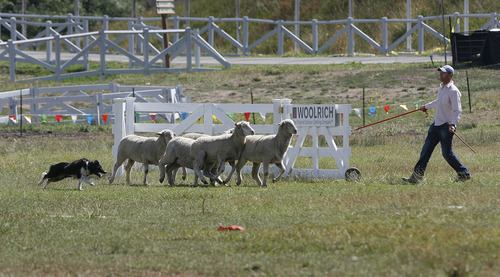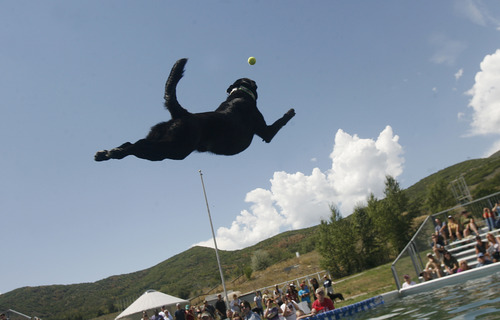This is an archived article that was published on sltrib.com in 2013, and information in the article may be outdated. It is provided only for personal research purposes and may not be reprinted.
Soldier Hollow • Tom Wilson was cautiously optimistic that his three-year-old, Roy, would stay calm.
After all, the youngster had a steady gaze and seemed unruffled by the hordes of people swarming Soldier Hollow on Saturday for the games.
Wilson, now of central Virginia, but originally from Scotland, modestly mentioned that Roy's mother, Sly, had taken the gold a few years ago. Winning was in Roy's DNA, to say nothing of Wilson's own expert training.
When put to the test, however, Roy faltered, got distracted, ran too fast, lost focus and lost control.
"He's a typical male; he doesn't listen well," Wilson says with a shrug, his accent still laced with a Scottish brogue. "He may not have the demeanor for this competition. I have a female who has smoother movements. She's got the calm."
And so it went for the 62 border collies competing at the 11th annual Soldier Hollow Classic Sheepdog Championship on a hillside outside Heber, advertised as the "world's foremost invitational sheepdog competition."
Handlers and collies were invited to participate based on previous records and wins at trials around the world. This year, competitors came from as far away as South Africa, Brazil and Canada to showcase their canine athleticism and leadership skills.
No matter how prestigious or well-trained the dogs, however, the winners are not predictable.
"You never know what's going to happen," says Shauna Gourney, a handler in Plain City, Utah, who also runs a dog boarding and training facility called Flock 'N Paws. "You never get bored."
The dogs have 12 minutes to run the course — directing five sheep down a hill, through two sets of gates, up again and down into a pen — and get deductions for "over-flanking, unsteadiness, rushing, slowness, too many commands, missing gates, deviation from the line."
They are only allowed to nip or bite a sheep in "self-defense," Gourney says. "If they make the first move, they will be disqualified."
The idea of testing sheepdogs against each other began in the latter part of the 19th century, according to a history posted on a website for a competition in Klamath Falls, Ore.
"The best working collies could be found in the border counties between Scotland and England, hence, the name 'Border Collie' is used today," the site says. "Border Collies are prized for their skills in gathering, driving, penning, singling and shedding (separating out particular sheep from the flock). They exhibit what is known as 'eye', the ability to hold and control sheep with only the force of their firmly planted feet and fixed stare."
Today, there are hundreds of such competitions, known as "trials," in Wales, Scotland and England, as well as scores more in the United States.
"You could go to one every week of the year," says Gourney, whose dogs have competed in many such games.
But the Soldier Hollow course is particularly challenging. With its altitude and grading, it is quite different than races on the East Coast. Temperatures Saturday also reached into the upper 90s, unlike the cooler weather in other states.
Also, there is a grove of trees that blocks the sight line between handler and collie as the dog chases the sheep between a set of gates, making it tough for the human to get signals to the dog.
"We call it the 'death zone," Gourney says, "or 'the Bermuda triangle.' "
Second, the Utah sheep are known as "range ewes," meaning they have not been herded by dogs.
When the dog first approaches, the sheep may fear it is a coyote, out to kill them.
"The dog's first job is to reassure the sheep that she means them no harm," says event organizer Mark Petersen. "The sheep could turn and run. The dog has to show that she cares."
The dog who wins, Petersen says, "is the one who gets the job done, shows that he or she is a good shepherd."
Unlike other dog competitions, he says, this one is based on teamwork, not simple obedience.
"You expect your dog to disobey you," Petersen says, "when you are wrong."
This annual event, which continues through Monday with a final competition among the top 15 dogs, has continued to attract bigger and bigger crowds, he says. This year is on par to top 30,000 attendees, the largest group audience ever.
"This sport grabs a hold of you," Petersen says, "and you become passionate about it."
Gourney, one of the few female dog handlers in a mostly male-dominated field, agrees.
If it was too easy, she says with a smile, "it wouldn't be fun."


